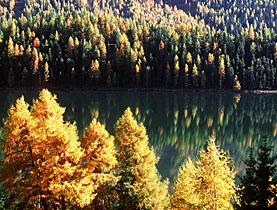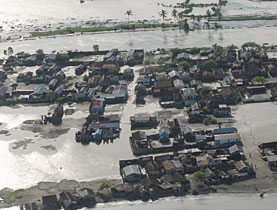Forests need protection from climate change

Swiss environmental authorities attending a conference in Rome have urged European countries to address the growing impact of climate change on forests.
The delegation, meeting to mark European Forest Week, told policymakers and experts that climate change was becoming a major challenge for foresters and that greater government action was needed.
Environmentalists were gathering all this week at the Ministerial Conference on the Protection of Forests in Europe to understand the value of forests and how to use them sustainably.
On the agenda was reinforcing the message that forests play a key role in mitigating climate change by absorbing and storing harmful greenhouse gases.
But the same forests are suffering from the effects of climate change. Increases in the earth’s temperature and rainfall as well as seasonal shifts are believed to affect the growth rates, structure and ecosystems within forests, and the distribution of tree species.
“A message from Switzerland is that we are facing quite a challenge in the future with climate change, which will also impact on forests,” Rolf Manser, head of the forest division at the Federal Environment Office, told swissinfo.
“We made the other participants aware of that. We said that it is a subject that you have to deal with and face.”
The Swiss government is in the process of updating its entire forestry strategy in relation to climate change, and its the biggest concern – deforestation, Manser said.
According to the environmental group Greenpeace, tropical deforestation has to be stopped within ten years to help combat climate change.
“Tropical deforestation is responsible for around a fifth of greenhouse gas emissions, more than all the emissions from the world’s transport sector,” says Asto Roesle, of Greenpeace Switzerland.
Shared experience
There was unanimous agreement among the Rome conference’s delegates that cooperation between environmental interest groups was key to solving major threats to the world’s forests, such as fires and illegal logging.
“We already know that you cannot solve the problems that you have in the forests within the forest sector alone,” explained Manser.
“You have to integrate other sectors, you have to talk with the water sector, the climate sector. That’s something that was clearly confirmed here at this conference.”
The conference was not all bad news. Delegates heard that forested area in Europe had increased by 13 million hectares in the past 15 years, with sustainable forest management playing a key role in this positive development.
The amount of wood in Europe’s forests is growing by around 360 million cubic metres per year, with only two-thirds of the annual increase harvested.
Switzerland sets a standard for other countries with its strong laws supporting sustainable forest management, Masner added.
“Switzerland has great experience in sustainable forest management and we have a legal basis for sustainable forest management. What we can do is be a good example. We can share our experiences with others.”
swissinfo, Jessica Dacey
Around 31% of Switzerland is forested, with 29% of the areas privately owned. One third of the total forest area is located in the Alps.
Switzerland harvested 5.7 million cubic metres of wood in 2007. There are 5,844 people working in the forestry sector and around 82,000 people working in the wood, chemical pulp and paper industries.
The first Swiss forestry laws date back to 1876 and 1902. The 1991 law, which entered into force in 1993, is a framework that outlines the main principles that the cantons are responsible for implementing.
At the 1992 Rio Summit, Switzerland committed to the sustainability of its forests. In October 2005 interest groups put forward a people’s initiative to better protect Swiss forests. The government is now revising part of the 1991 law to strengthen the forestry services and economy.
Forests provide wood, medicinal plants and food, and are integral to regulating climate. Wood can be a substitute for energy-intensive materials and is an important source of renewable energy.
The environmental group WWF estimates that a football field of tropical forest is destroyed every second, with two-thirds of the planet’s forested areas already gone. Forests in Canada, Scandinavia and Siberia are under threat, being replaced by plantations or destroyed by acid rain.
Forest fires and illegal logging are serious threats. Increases in the earth’s temperature and rainfall and seasonal shifts are believed to have an effect on forests’ growth rates, structure, ecosystems and distribution of different tree species.

In compliance with the JTI standards
More: SWI swissinfo.ch certified by the Journalism Trust Initiative




You can find an overview of ongoing debates with our journalists here. Please join us!
If you want to start a conversation about a topic raised in this article or want to report factual errors, email us at english@swissinfo.ch.